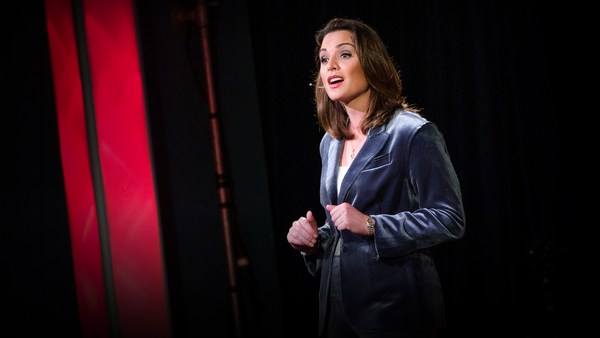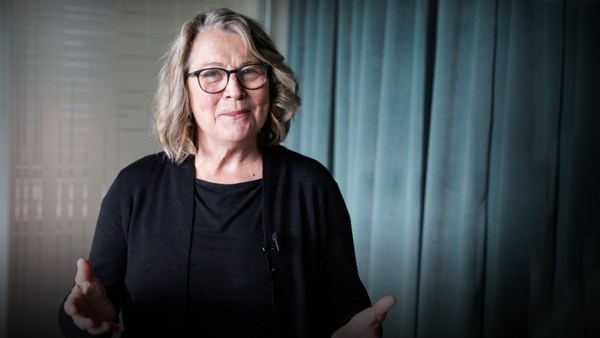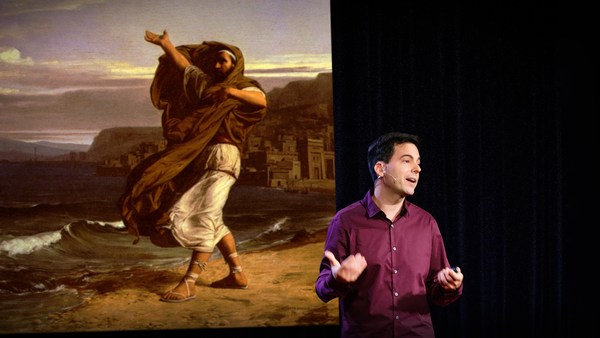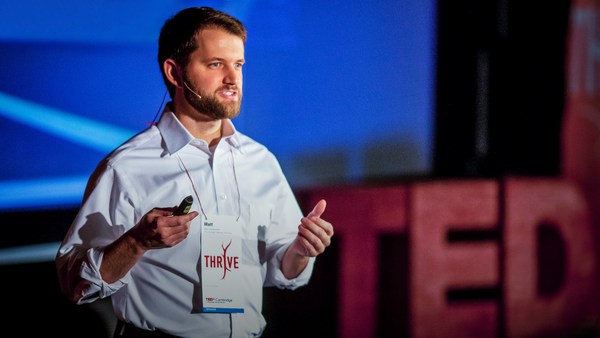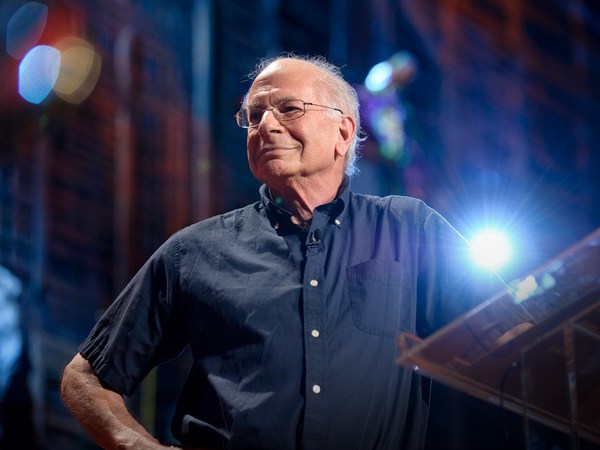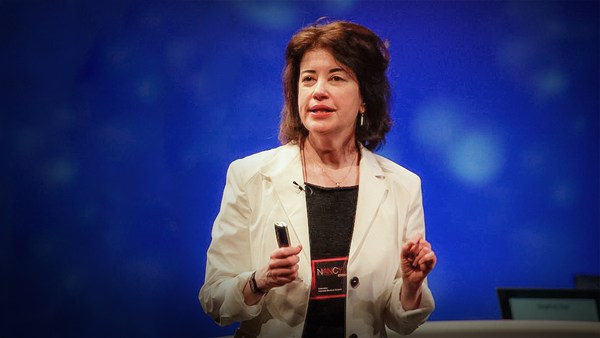Hello, my name is Dom Price and I'm a work futurist, which is a made-up job that no one's called me out on yet, but it's got me here on this stage today. My job's all about predicting the future, the future of work, society, the economy and education. Which, surely you can imagine this year of all the years, it's been pretty fascinating. Now, there's a huge amount of self-help literature out there that will help you be happier over time. But today, I want to talk to you specifically about being happy in a year like 2020.
It's a year like no other. It's a year when many of us haven't felt of much happiness or our happy days have been reduced to happy minutes and moments. And the uncertainty of the future has quite rightly weighed heavily on our minds. But to talk to you about a year like 2020, and to talk about how shit it's been, first of all, I have to tell you how shit my year has been.
You see, my sister is my best friend, and a few years ago I got the call that no brother wants to get. Trudy had been diagnosed with stage IV breast cancer, and given that she lived a 24-hour flight away in Manchester, England, as a single mother of two boys, I'm sure you can imagine how I felt. But she's stubborn as an ox. And six years later, at the start of 2020, she was still with us. Then February rolled in. I got another call. This time it was my doctor telling me that I had early-stage bowel cancer. A week later, I had a subtotal colectomy and I had my colon removed. Strangely, the same day my sister went to see her specialist in the UK, who confirmed that they were ceasing all treatment. She had a matter of months left to live.
Now, post-surgery, I wasn't officially allowed to travel due to COVID travel restrictions, but I managed to get an exemption from the government and I was on one of very few flights out to Manchester in April to look after my sister and her two boys. A few weeks later, on Tuesday, May 19, Trudy collapsed suddenly at home. Despite trying CPR, she died in my arms before the ambulance arrived. She was 45.
After some very emotional goodbyes to family, the only thing certain in my immediate future was 14 days in quarantine. But before I got on that plane, I gave my nephews an extra special uncle-Dom hug. And in those 14 days in quarantine, you're kind of left alone with your own thoughts. And it got me thinking, where does our happiness actually come from? How can a year this shit make anyone happy? And the problem with those thoughts is when you've got 14 days, you really do get to invest in them. And it got me thinking, how can we find our happiness? And as is with death, sometimes, I actually started thinking with renewed clarity about life and work and COVID and all the things that mattered.
In Bronnie Ware's book "The Top Five Regrets of the Dying," Bronnie will tell you the second-biggest regret is "I wish I hadn't spent so much time in the office." But you don't need me to tell you that. You know what's important on your deathbed, the love of friends and family, the legacy you're leaving behind, knowing that you've done things that made you happy, knowing that you've done great things. And yet few of us can honestly say this is how we're living our lives today.
Take work, for example. Work today stems from the Industrial Revolution 300 years ago. That's when we were the machines, we were the robots. It was all about presenteeism. We worked on the production line. We were measured by speed and efficiency. It was about how much work you could get done in one day. Let's be honest, it was about making your boss richer. And in that time, we had these measures of success, economic growth and productivity.
We’re 300 years later, and it’s simply not working. Productivity growth has stagnated. Australia is one of the worst-performing countries in terms of longer working hours. And this idea of productivity that governments and businesses speak about all the time, it measures 10 million dollars invested in a hospital, the same as 10 million dollars spent on a coal-fired power plant. And our most precious resource, the planet, is dying, and we have no planet B.
So we're not happy at work. And we're not productive. And oddly, in the time of the pandemic, when we're touting mental health and wellness and the importance of people, studies show we've actually extended the average working day by 40 minutes since March this year. All in the pursuit of productivity. And I think it's because we first thought that COVID was a fleeting moment. You see, COVID is like a snowstorm. After years of what seemed like endless sunshine outside, we looked out and we saw snow. So we did the right thing. We closed the windows and doors and we stayed inside. But a few weeks later, we looked out and it was still snowing. And we're like, "Ah, it's not a snowstorm, it's winter." So we did the right thing. We went online, bought a new jumper jacket and a scarf. But by the time they were delivered to our door, we realized it wasn't winter. It was the ice age. What was the moment when you realized that this was the ice age?
Think about it. That moment when you sat there and thought, "It's kind of not an eight-week thing anymore, this, is it? It's been here for a while. In fact, maybe it's here forever." And how did that moment of realization make you feel about work, something that you spend about a third of your time doing, by the way?
I can tell you how it made 5,000 people feel across Australia, the US, Japan, France and Germany in a recent study commissioned by Atlassian. Despite the fact that people weren't commuting to work and therefore saving that time, nearly half of respondents said they had less time for personal pursuits. Personal pursuits, the things that actually make you happy. And the number one complaint at this time? Work-life balance. Me personally, I've put on five kilos since March. I'm drinking more and I'm sleeping less. That's COVID's fault, right? Or is it simply that I'm just not happy? That in my relentless pursuit of productivity, I've lost sight of what's really important.
Now, we could spend the rest of this talk sharing stories about how unhappy we are, or we can actually flip the tables and talk about what we can do. I'm choosing to do the latter. I'd like you to close your eyes for a second. I want you to imagine a world where our measure of success is not productivity. I want you to imagine a world where instead of thinking about busyness and titles and bank balances, we think about our impact on the world. I want you to imagine a world where status isn't the reason for our existence. Open your eyes.
I'd now like to introduce you to the Personal Moral Inventory. The Personal Moral Inventory is inspired by two pieces of work. The first, the work from the world of finance, something called the quadruple bottom line, aimed at getting businesses to report in a more rounded fashion. The second, an exercise that elite military personnel go through to self-assess themselves and their teammates before going into battle. I believe that these four things, Productivity and Profit, People, the Planet and our Purpose, are the secret to our happiness. And what's important in the time of the ice age, the time we're in right now, is not to get distracted by the things we can't do, but to find the things that we can do. It's on us to take ownership and control of our own happiness.
Let's do the exercise together. What I’m going to do is rate each area minus one, zero or one. One is you're nailing it. High fives all round, good on you. Zero is you're getting by. Not awesome. Not awful. And minus one is you're struggling. Here's mine for this year. For Productivity and Profit, I'm a one. I have a good job, I have a good salary, I have a roof over my head, I can pay the bills. But here's the thing. You can't score more than a one, so it becomes impossible to pack all your happiness into one category. And it's like we're all trying to get to a two on Productivity, but to what extent? The next area is People. People is about how you think about your personal, mental and physical health. You have to start with yourself. You have to put your own oxygen mask on before you can help others. This is also about how you impact family, friends, society. It's about being human and having a positive impact on humanity. For this, I score myself a zero. Planet. Let's just say I took over 100 flights last year, so I'm going to score myself a minus one. And finally, Purpose. Purpose is about the impact you want to have and the legacy you want to leave behind. It's the why you do what you do. For this, I score myself a zero.
Now, I can already tell the keen beans in the room and online are trying to add this up and net this off. That is not how it works. Your positive impacts in one category doesn't mitigate your negative impacts in another category. For me, the fact that I'm financially well off doesn't make up for the fact that I'm killing the planet. It wasn't this realization, though, that got me thinking something had to change.
Shortly after my sister passed away, I did this exercise on her behalf. And it got me thinking. For Productivity and Profit, she was a zero. She struggled financially. In her final few years she couldn't work, but she got by. For People, she was a definite one. She really knew her own identity. She invested in her life. She had a lot of fun. You all remember the party you were at with Trudy. And she invested in the local school, community, friends and family. For Planet, she was also a one. She had a very low carbon footprint. She very rarely flew anywhere. She didn't own a car. She was avid at reduce, reuse, recycle. And in winter, she would make you put a jumper on before she'd let you turn the heating on. And on Purpose, she was also a strong one. She knew the legacy she wanted to leave behind. She knew exactly why she was on this planet. Purpose isn't about being a superhero. It's not about wearing a cape or single-handedly saving the world. Trudy's purpose was to give those two boys the best upbringing in the small time that she had available.
I learned two things doing this exercise for her. Firstly, I learned that happiness is contextual. Like, for Trudy, the fact that she was financially struggling, she didn't let that dictate her happiness. She didn't put all her eggs in that basket and shut up shop. But the second realization hit me a lot harder. Despite everything, Trudy was happier than me.
Here's where we get to take our happiness into our own hands. What I want you to do is to think about the areas where you would score zero or minus one and commit to doing something to improve. So whatever you commit to do, I want you to give it a red hot go in the next summer. Why? Well, the best time to plant a tree was 20 years ago. The second best time is today. So we're going to do this right now. For me, my worst score was Planet. I'm going to commit to going meat-free for three days a week and then I'll reassess. I've already changed my energy provider to one that's carbon neutral. And I've invested in a company that's trying to save our oceans. Small steps, but then I can reassess. On People, I'm going to commit to be more present with the people I care about. For the last four years, I've essentially been single and if I'm really honest, I was emotionally unavailable. But I've actually been very fortunate to meet someone amazing. So what I’m going to do is commit to investing in that relationship with openness, authenticity and vulnerability. And a little bit of cheekiness. And on Purpose, a year ago, I was actually a one on Purpose. My purpose was twofold, it was the impact I was having on people through my public speaking, and it was the precious time I got to spend with my sister. But in a few short weeks at the start of 2020, both of those disappeared. And in the months since, I've been really trying to rediscover my purpose. And I'll be honest, I've really struggled to find it. And I think that's OK. But then I realized that I have this, today, this moment. This is me rediscovering my purpose.
What are you going to do? What action are you going to take? Whatever action you do take, you suddenly realize that you can stop hinging all your happiness on one category of the personal moral inventory. Instead, you invest in taking control of your own happiness. Our future is not predetermined. Our future is not written and our future is not waiting for us. I'm building mine and I believe you are building yours. And how happy we are in our future will be based solely on our action or inaction across all facets of life, not just the working week. I am the key to unleashing my own happiness, and I believe you are the key to unleashing your own happiness.
I can safely say that Trudy didn't have any regrets, but she did have one wish. To see me on stage, live, presenting at TEDx.
Thank you very much.
